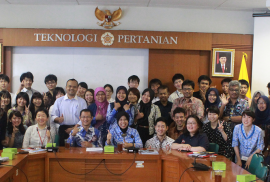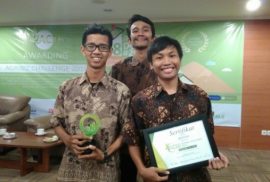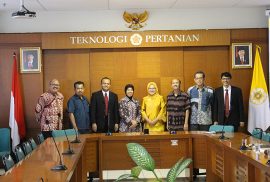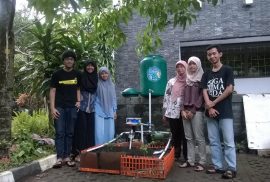Gadjah Mada University, in this case the Faculty of Agricultural Technology becomes the host of one of the activities of Six University Initiative Japan Indonesia (SUIJI), which is Service Learning Program (SLP) or KKN, followed by 22 students and 3 lecturers (Prof. Kasamatsu Hiroki, Prof. Yukie Matsumura, Prof. Fujino Noriko) from 3 universities in Japan, namely Ehime University, Kagawa University, and Kochi University, which run from February 23 to March 13, 2017. SUIJI-SLP activities are located in 2 locations of Yogyakarta, Srimartani village of Bantul and Banyusoca village, Gunungkidul accompanied by 25 students from Faculty of Agrocomplex UGM (Agricultural Technology, Agriculture, Animal Husbandry and Forestry) and 6 Field Supervisors from Faculty of Agricultural Technology UGM (Dr. Nursigit Bintoro, Dr. Agung Putra Pamungkas, Zaki Utama , MP, Dr. Ngadisih, Dr. Joko Nugroho W. Karyadi and Dr. Rachma Wikandari).
Students of Universitas Gadjah Mada (UGM) succeeded in developing the irrigation system automatically according to the needs of the plant in the area of ??oil palm plantation. Tools that are still a prototype is even a champion in the competition Agribiz Challenge which was held in December 2016 ago.
The irrigation system, named “AiRi”, won the first category on farm in the prestigious event by setting aside hundreds of other works. This system was developed by Andrianto Ansari from the Faculty of Agricultural Technology (FTP) in collaboration with several FTP alumni, Widagdo Purbowaskito, Yustafat Fawzi, and Dualim Atma and Muhammad Ghufron Mustaqim from FISIPOL. The five are incorporated in Merapi Tani Instrument (Mertani) Indonesia team.
“AiRi is an automation technology for irrigation in palm oil breeding that combines hardware and software that works in real time,” explained Andrianto, Wednesday (4/1).
Andrianto describes the development of tools that have been done since 2012 ago was originated from concerns about irrigation systems by Indonesian farmers because it is still running traditionally. Irrigation manually is considered less effective because it requires a lot of manpower and time in the process.
With the irrigation automation technology is expected not only can reduce expenses and energy. However, it can also optimize plant growth and save water usage.
The irrigation automation technology, said Andrianto, uses nutritional sensors, ground humid sensors, and microclimate sensors based on wireless networks. Through the sensors it can be known conditions of soil moisture, nutrients and climate in the plantation area. This tool is also equipped with solar panels as a source of energy in the operation of this irrigation system.
“This tool works automatically when plants need water,” said the man from Sedayu, Bantul this.
AiRi works by draining automatic irrigation water when plants need water through the approach of wilting point. Then irrigation will stop automatically when the land reaches the field capacity through the reading of moisture score.
“That way, this irrigation automation system can save water usage,” he said.
AiRi has been applied in several places one of the Palm Oil Research Center (PPKS) Medan. In addition, also been tested in the tobacco plantation PTPN X Klaten.
Currently, the irrigation system developed by five young people is in the form of drip irrigation system. But in the future, they will develop with sprinkler system for more optimal watering.
“Various developments continue to do so that this tool can work more leverage and mass produced to the benefits can be felt directly by the community,” he concluded. (Public Relations UGM / Ika)
Has been inaugurated by Vice Dean of Faculty of Agricultural Technology Universitas Gadjah Mada period, that is:
1. Prof. Dr. Yudi Pranoto, S.T.P., M.P. (Vice Dean for Academic and Student Affairs)
2. Dr. Kuncoro Harto Widodo, S.T.P., M.Eng. (Vice Dean for Finance, Assets, Human Resources, and Information Systems)
3. Dr. Sri Rahayoe, S.T.P., M.P. (Vice Dean for Research, Community Service, Cooperation, and Alumni)
Coastal land has great potential to be developed as an agricultural area. Utilization has now been done, one of them in the southern coast of Yogyakarta. However, the problem of inefficient irrigation and physiological damage of plants due to salinity levels carried by the sea breeze is still a major obstacle in the development of agriculture in coastal sand.
Departing from these problems, five students of Department of Agricultural Engineering FTP UGM were encouraged to create a tool to overcome this. They are Mohammad Taufik Hidayatullah, Dwi Noor Rohmah, Haryo Prastono, Utik Tri Wulan Cahya, and Shofwatul Fadilah who created a micro-controller based automatic control system on drip irrigation system combined with salt washing system on the leaves of agricultural crops in the sand beach named ISIS (Integrated Irrigation System).
The ISIS (Integrated Irrigation System) control system works by automatically draining the irrigation water when the plants need water through a point-of-point approach (TL) and stop when the soil reaches the capacity to hold water (Field Capacity) through the sensor reading of moisture content. This control system will also activate the automatic sprinkler automatically to wash the leaves when the salt content in the air reaches the maximum limit that can leaf physiologically leaf through the reading of the air salt sensors.
“The application of this tool is intended to meet the needs of plants in accordance with precision irrigation scheduling and plants that grow can develop more optimally with salt washing on the leaf surface,” said Chairman of the ISIS development team, Mohammad Taufik on Wednesday (17/6) on campus FTP UGM.
The ISIS control system, he said, is expected to maintain the soil in the state of Available Moisture (AM) ie where the water is in a state available for plant growth. In addition, ISIS is also able to save water usage because there is no surface flow or location. The hope with this irrigation system can improve agricultural productivity by minimizing the occurrence of growth disturbance due to excess or lack of water during the irrigation and physiological disturbance of tanman due to salt disturbance carried by sea breeze.
“The making of this tool is also a form of soil and water conservation efforts that impact on environmental sustainability,” he said (Ilyas)




